

Schizophrenia and violence: systematic review and meta-analysis. Background: Although expert opinion has asserted that there is an increased risk of violence in individuals with schizophrenia and other psychoses, there is substantial heterogeneity between studies reporting risk of violence, and uncertainty over the causes of this heterogeneity.
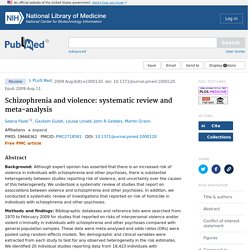
We undertook a systematic review of studies that report on associations between violence and schizophrenia and other psychoses. In addition, we conducted a systematic review of investigations that reported on risk of homicide in individuals with schizophrenia and other psychoses. Methods and findings: Bibliographic databases and reference lists were searched from 1970 to February 2009 for studies that reported on risks of interpersonal violence and/or violent criminality in individuals with schizophrenia and other psychoses compared with general population samples. White Matter Disruptions in Schizophrenia Are Spatially Widespread and Topologically Converge on Brain Network Hubs. Cortical grey matter volume reduction in people with schizophrenia is associated with neuro-inflammation. Brain structure, function, and neurochemistry in schizophrenia and bipolar disorder—a systematic review of the magnetic resonance neuroimaging literature.
First rank symptoms for schizophrenia. On the neurobiology of hallucinations. Variation in Fourteen Brain Structure Volumes in Schizophrenia: A Comprehensive Meta-Analysis of 246 Studies. Cortical brain abnormalities in 4474 individuals with schizophrenia and 5098 controls via the ENIGMA consortium. Biological insights from 108 schizophrenia-associated genetic loci. Intensive DNA search yields 10 genes tied directly to schizophrenia. HOUSTON, TEXAS—Schizophrenia tends to run in families, which suggests it’s largely inherited.
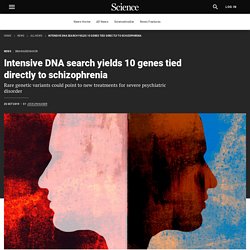
But a long-running search for genes underlying this severe psychiatric condition has yielded only indirect clues. Now, by scouring the DNA of tens of thousands of people, gene hunters have for the first time nabbed a handful of rare genes that, when mutated, appear to be direct contributors to the disease—and may shed light on what goes awry in a schizophrenia patient’s brain. “These are concrete genes with mutations with a clear molecular mechanism,” says Mark Daly of the Broad Institute in Cambridge, Massachusetts, and the University of Helsinki, who is principal investigator for a consortium that presented the work last week at the annual meeting of the American Society of Human Genetics (ASHG) here.
Schizophrenia. What is Schizophrenia? What Is Schizophrenia? Please read the entire Privacy Policy of the American Psychiatric Association (APA).
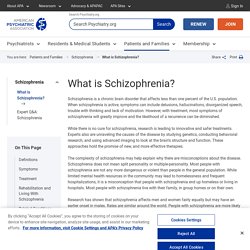
As described, this website utilizes cookies. By closing this message, continuing the navigation or otherwise continuing to view the APA’s websites, you confirm that you understand and accept the terms of the APA’s Privacy Policy, including the use of cookies. Read Our Privacy Policy I agree ShareThis Copy and Paste Please read the entire Privacy Policy of the American Psychiatric Association (APA). Brain region - auditory verbal hallucinations.
Summary: Researchers have identified a specific area of the brain responsible for auditory verbal hallucinations in people with schizophrenia.
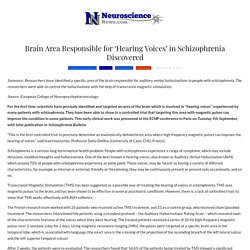
The researchers were able to control the hallucinations with the help of transcranial magnetic stimulation. Source: European College of Neuropsychopharmacology. For the first time, scientists have precisely identified and targeted an area of the brain which is involved in “hearing voices”, experienced by many patients with schizophrenia. They have been able to show in a controlled trial that targeting this area with magnetic pulses can improve the condition in some patients. This early clinical work was presented at the ECNP conference in Paris on Tuesday 5th September, with later publication in Schizophrenia Bulletin. Schizophrenia News. Engaging With Schizophrenia: Experts Argue for New Approaches to Treatment Feb. 24, 2020 — A better understanding of the lived experience of people with schizophrenia would enable clinicians to help patients live with their condition, alongside treating symptoms with medication and ... read more New Insight Into How Cannabidiol Takes Effect in the Brains of People With Psychosis Jan. 29, 2020 — Researchers have shown that cannabidiol (CBD) alters the brain activity in people with psychosis during memory tasks, making it more similar to the activation seen in people without psychosis during ... read more.

Brain-states influence sensory processing. Introduction Even at the earliest stages of sensory processing, the neuronal representation of external stimuli is modulated by internal brain states (Aston-Jones and Cohen, 2005; Harris and Thiele, 2011).
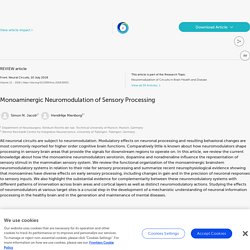
While the evidence for such modulation is long-standing, the analysis of sensory representations has typically focused on the feed-forward stimulus-driven component while regarding the modulation by internal states as noise. However, recent results based on population recordings (Reimer et al., 2014; Rabinowitz et al., 2015; Schölvinck et al., 2015) that highlight the extent of brain-state dependent modulation of sensory processing, the discovery of substantial modulation of sensory activity with locomotion (Niell and Stryker, 2010; Polack et al., 2013), as well as novel tools to more selectively target modulatory circuit elements genetically have contributed to reviving the interest in the neuromodulation of sensory processing.
FIGURE 1. Schizophrenia. Genetics of schizophrenia (Review) Glial cells in schizophrenia: a unified hypothesis. The cellular neurobiology of schizophrenia remains poorly understood.
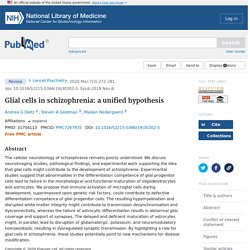
We discuss neuroimaging studies, pathological findings, and experimental work supporting the idea that glial cells might contribute to the development of schizophrenia. Experimental studies suggest that abnormalities in the differentiation competence of glial progenitor cells lead to failure in the morphological and functional maturation of oligodendrocytes and astrocytes.
We propose that immune activation of microglial cells during development, superimposed upon genetic risk factors, could contribute to defective differentiation competence of glial progenitor cells. Genetics of schizophrenia (Review) 1.
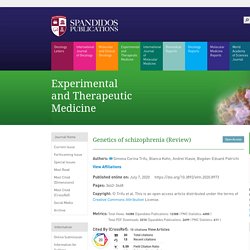
Introduction Schizophrenia is a common yet devastating mental disorder characterized by a series of cognitive, behavioral and emotional dysfunctions, none of which are pathognomonic for the disease. It includes both positive symptoms, mainly represented by hallucinations and delusions and negative ones, such as blunted affect, avolition and social isolation, along with disturbed attention, executive function and working memory (1). Structural changes in the brain (white matter, grey matter, size) have been shown in controlled neuropathology leading to the idea that schizophrenia might be a true psychosomatic disorder (2). Heritability of Schizophrenia and Schizophrenia Spectrum Based on the Nationwide Danish Twin Register - Biological Psychiatry.
Why Am I Heading Voices? Auditory Hallucination Causes and Treatment. U.S.
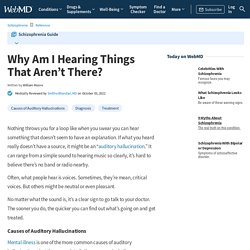
National Library of Medicine: “Visual Hallucinations: Differential Diagnosis and Treatment,” “Hallucinations as a trauma-based memory: implications for psychological interventions,” “Hallucinations: Clinical aspects and management,” “Hypothyroidism Presenting as Psychosis: Myxedema Madness Revisited,” “Auditory hallucinations in tinnitus patients: Emotional relationships and depression.” American Journal of Psychiatry: “The Clinical Value of Hallucinations in Localizing Brain Tumors.” British Tinnitus Association: “Musical Hallucination (Musical Tinnitus).” M95. DSM-5 CLINICIAN-RATED DIMENSIONS OF PSYCHOSIS SYMPTOM SEVERITY: PSYCHOMETRIC PROPERTIES. New Targets for Schizophrenia Treatment beyond the Dopamine Hypothesis. Schizophrenia not a single disease but multiple genetically distinct disorders.
New research shows that schizophrenia isn't a single disease but a group of eight genetically distinct disorders, each with its own set of symptoms.
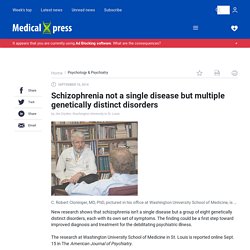
The finding could be a first step toward improved diagnosis and treatment for the debilitating psychiatric illness. The research at Washington University School of Medicine in St. Louis is reported online Sept. 15 in The American Journal of Psychiatry. About 80 percent of the risk for schizophrenia is known to be inherited, but scientists have struggled to identify specific genes for the condition.
The neuropathology of schizophrenia. Structural imaging in schizophrenia The cardinal findings Contemporary research into the structural basis of schizophrenia can be traced to the landmark report of Johnstone et al. (1976) describing dilatation of the lateral ventricles in a small group of patients with chronic schizophrenia. This CT finding, which was consistent with earlier pneumoencephalographic data (Haug, 1982), has been followed by a large number of CT and MRI studies with ever-improving resolution and sophistication of analysis.
The key findings are as follows. - Schizophrenia Genetics and Heredity. Family statistics As can be seen from the graph below, schizophrenia definitely has a very significant genetic component. Those who have a third degree relative with schizophrenia are twice as likely to develop schizophrenia as those in the general population. Those with a second degree relative have a several-fold higher incidence of schizophrenia than the general population, and first degree relatives have an incidence of schizophrenia an order of magnitude higher than the general populace. Schizophrenia Is a Hybrid of 8 Disorders. Schizophrenia - Genetics Home Reference - NIH. Schizophrenia is a brain disorder classified as a psychosis, which means that it affects a person's thinking, sense of self, and perceptions. The disorder typically becomes evident during late adolescence or early adulthood.
Signs and symptoms of schizophrenia include false perceptions called hallucinations. Auditory hallucinations of voices are the most common hallucinations in schizophrenia, but affected individuals can also experience hallucinations of visions, smells, or touch (tactile) sensations. Strongly held false beliefs (delusions) are also characteristic of schizophrenia. For example, affected individuals may be certain that they are a particular historical figure or that they are being plotted against or controlled by others. Characterizing white matter changes in chronic schizophrenia: A free-water imaging multi-site study. Towards an Immunophenotype of Schizophrenia: Progress, Potential Mechanisms, and Future Directions. Guidelines for the Pharmacotherapy of Schizophrenia in Adults. Brief Psychotic Disorder & Psychotic Breaks: Types, Symptoms, & Treatment.
This is what doctors call psychotic symptoms that come on suddenly but last only for a short time -- less than 1 month. After that, people usually recover completely. There are three basic forms of brief psychotic disorders: Brief psychotic disorder with obvious stressor (also called brief reactive psychosis): This type happens shortly after a trauma or major stress, such as the death of a loved one, an accident, assault, or a natural disaster. It's usually a reaction to a very disturbing event. Brief psychotic disorder without obvious stressor: With this type, there is no apparent trauma or stress that triggers it. Symptoms The most obvious ones include: Hallucinations: Someone might hear voices, see things that aren't there, or feel sensations on their skin even though nothing is touching their body.
Delusions: These are false beliefs that someone refuses to give up, even in the face of facts. Rates of Homicide During the First Episode of Psychosis and After Treatment: A Systematic Review and Meta-analysis. GENETIC IDENTIFICATION OF BRAIN CELL TYPES UNDERLYING SCHIZOPHRENIA. Background. Schizophrenia Is a Hybrid of 8 Disorders. GENETIC IDENTIFICATION OF BRAIN CELL TYPES UNDERLYING SCHIZOPHRENIA. Putative presynaptic dopamine dysregulation in schizophrenia is supported by molecular evidence from post-mortem human midbrain. Common genetic determinants of schizophrenia and bipolar disorder in Swedish families: a population-based study. Genetics of Schizophrenia. Common genetic determinants of schizophrenia and bipolar disorder in Swedish families: a population-based study. Genetic disorders presenting as “schizophrenia”. Karl bonhoeffer's early view of the psychoses in the light of medical genetics.
Adler LE, Sadja L, Wilets G (1980) Cimetidine toxicity manifested as paranoia and hallucinations. Am J Psychiatry 137:1112–1113 Google ScholarAllen RM, Young SJ (1978) Phencyclidine-induced psychosis. Am J Psychiatry 135:1081–1084 Google ScholarAlsen V (1969) Schizophreniforme Psychosen mit belangvollem körperlichem Befund. Fortschr Neurol Psychiatr 37:448–457 Google ScholarAlsen V, Gremse B, Kröber HL (1983) Symptomatische Schizophrenien und Zyklothymien — phänomenologische Überschneidung organischer und endogener Psychosyndrome?
In: Huber G (Hrsg) 5. „Weissenauer” Schizophrenie-Symposium. Schizophrenia: Overview and Treatment Options. Modern psychosurgery before Egas Moniz: a tribute to Gottlieb Burckhardt in: Neurosurgical Focus Volume 25 Issue 1 (2008) First Rank Symptoms Schizophenia. Study suggests overdiagnosis of schizophrenia: Reported symptoms of anxiety and hearing voices most common reasons for misdiagnosis by non-specialty physicians. In a small study of patients referred to the Johns Hopkins Early Psychosis Intervention Clinic (EPIC), Johns Hopkins Medicine researchers report that about half the people referred to the clinic with a schizophrenia diagnosis didn't actually have schizophrenia.
Schizophrenia - Causes. The exact causes of schizophrenia are unknown, but research suggests that a combination of physical, genetic, psychological and environmental factors can make people more likely to develop the condition. Current thinking is that some people may be prone to schizophrenia, and a stressful or emotional life event might trigger a psychotic episode. However, it is not known why some people develop symptoms while others do not. Increased risk. Thought disorder in schizophrenia and mania: ... [Schizophr Bull. 2000] Autoimmune phenotypes in schizophrenia reveal novel treatment targets. Genetic identification of brain cell types underlying schizophrenia.
Genetic influences on schizophrenia and subcortical brain volumes: large-scale proof-of-concept and roadmap for future studies. Schizophrenia Genetics and Heredity. Schizophrenia not a single disease but multiple genetically distinct disorders. Uncovering the Hidden Risk Architecture of the Schizophrenias: Confirmation in Three Independent Genome-Wide Association Studies. Partitioning heritability analysis reveals a shared genetic basis of brain anatomy and schizophrenia. Researchers find key to keep working memory working. Working memory, the ability to hold a thought in mind even through distraction, is the foundation of abstract reasoning and a defining characteristic of the human brain.
It is also impaired in disorders such as schizophrenia and Alzheimer's disease. Now Yale researchers have found a key molecule that helps neurons maintain information in working memory, which could lead to potential treatments for neurocognitive disorders, they report March 19 in the journal Neuron. Broccoli sprout compound may restore brain chemistry imbalance linked to schizophrenia. A Complex Link Between Marijuana and Schizophrenia. Since the days of Reefer Madness, scientists have sought to understand the complex connection between marijuana and psychosis. Cannabis can cause short-term psychotic experiences, such as hallucinations and paranoia, even in healthy people, but researchers have also long noted a link between marijuana use and the chronic psychotic disorder, schizophrenia.
Repeatedly, studies have found that people with schizophrenia are about twice as likely to smoke pot as those who are unaffected. Conversely, data suggest that those who smoke cannabis are twice as likely to develop schizophrenia as nonsmokers. Cannabis May Cause Schizophrenia-Like Brain Changes. Researchers looking at the effects of cannabis on the brain have made some interesting discoveries. A Link Between Marijuana, Schizophrenia Is Tenuous. Marijuana, Cannabis and Schizophrenia - Schizophrenia.com.